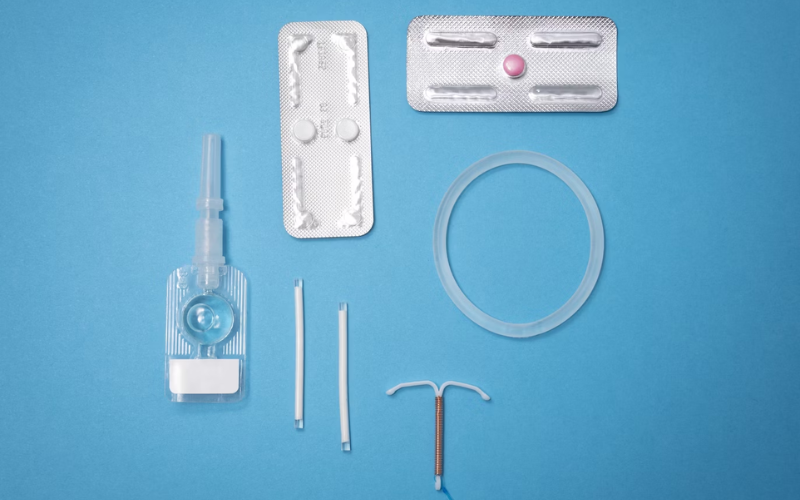In the landscape of women’s healthcare, the evolution of contraceptive choices has been revolutionary, empowering women to take charge of their reproductive health. The array of options available today goes beyond traditional methods, offering a spectrum of choices to suit individual preferences, lifestyles, and health considerations.
Navigating through these options can be overwhelming, but with informed decisions, women can make choices that align with their needs. In this article, we aim to shed light on the diverse world of modern contraceptives, providing insights into their mechanisms, benefits, and potential considerations.
Understanding Your Body and Needs
Embarking on the journey of contraceptive choices begins with self-awareness. Knowing your menstrual cycle, identifying fertile windows, and recognizing reproductive goals lay the foundation for informed decisions.
Whether seeking contraception for family planning or managing health conditions, this knowledge empowers women to choose methods that align with their unique needs. Understanding your body ensures that the selected contraceptive method complements personal preferences, leading to a more satisfying and effective experience.
Being attuned to your body also involves recognizing changes in hormonal patterns and potential side effects. Regular self-checks and monitoring provide insights into how different contraceptives may impact your overall well-being. This proactive approach helps in maintaining a healthy balance between reproductive goals and overall health.
The Pill: Hormonal Convenience
The birth control pill has been a trailblazer since its introduction, offering a convenient and effective hormonal option. With various formulations available, each tailored to different needs and preferences, the pill provides flexibility for women.
Understanding the pill’s mechanisms and potential side effects is crucial for making informed choices about its compatibility with hormonal and lifestyle preferences. This knowledge empowers women to navigate the landscape of oral contraceptives. This ensures that the selected pill aligns seamlessly with individual health goals and daily routines.
However, it’s essential to note that consistency is key with oral contraceptives. Taking the pill at the same time daily optimizes its effectiveness, and open communication with healthcare professionals aids in managing any side effects.
According to the NHS, this birth control method is more than 99% effective. The rate of unintended pregnancies is below 1 in 100 for women who consistently use birth control pills.
Embracing Hormone-Free Choices: The IUD
For those seeking contraception without hormonal influence, Intrauterine Devices (IUDs) emerge as a prominent choice. The copper IUD, in particular, is hormone-free, offering a long-term solution for women with diverse health considerations. Understanding the benefits, potential side effects, and how IUDs fit into a woman’s life aids in making well-informed decisions.
A copper IUD, known as Paragard, is a hormone-free, long-lasting contraceptive option that has been on the market since 1984. Manufactured by CooperSurgical, Paragard is marketed as a convenient, highly effective birth control device that lasts for up to 10 years. According to Verywell Health, it is the only hormone-free IUD available in the United States. It claims an effective birth control rate of over 99%.
While Paragard is generally considered safe for most individuals, recent legal developments have shed light on complications associated with Paragard. TorHoerman Law notes that this has led to legal action against its manufacturers. Women have filed lawsuits alleging that Paragard can break during removal, causing complications such as pain, perforation of the uterus or cervix, and infertility.
The Paragard lawsuit claims that CooperSurgical failed to adequately warn users about the risk of complications from Paragard. As of October 2023, over 2,100 lawsuits are pending in multidistrict litigation, indicating ongoing legal scrutiny and potential implications for Paragard users. It’s crucial for women using or considering Paragard to stay informed about these legal developments.
The Dual Role of Hormonal Implants
Hormonal implants, a discreet yet powerful contraceptive option, play a dual role in contraception and hormone management. Hormonal implants release progestin, inhibiting ovulation and thickening cervical mucus to prevent sperm from reaching the egg.
Their convenience lies in the long-lasting protection they offer, often lasting for several years. This makes hormonal implants suitable for women with busy lifestyles or those desiring a low-maintenance contraceptive option. However, individual responses to hormonal implants can vary.
Open communication with healthcare providers is essential for monitoring potential side effects or addressing concerns about their impact on the menstrual cycle.
Navigating Natural Methods: Fertility Awareness
For women desiring a non-invasive, natural approach, fertility awareness methods provide a compelling option. Empowering women with knowledge about their fertility cycles, fertility awareness becomes a valuable tool for family planning.
By tracking basal body temperature, cervical mucus, and menstrual cycles, women can identify fertile windows and make informed choices about contraception. Fertility awareness requires commitment and consistency in tracking these indicators.
According to Planned Parenthood, fertility awareness is anywhere between 77%-98% effective. It is most effective when partnered with regular communication with healthcare providers, ensuring accurate tracking and providing support in understanding fertility patterns.
Fertility awareness methods also foster a deeper connection with one’s body and menstrual cycle, promoting a holistic approach to reproductive health.
Patch, Ring, and Injection: Expanding Options
In the dynamic world of modern contraceptives, patches, vaginal rings, and injections offer alternative choices for women. Contraceptive patches, worn on the skin, release hormones into the bloodstream, inhibiting ovulation and thickening cervical mucus.
Vaginal rings, inserted monthly, provide a steady release of hormones for effective contraception. Injectable contraceptives, administered every few months, offer convenience for those seeking a less frequent commitment.
Each method has its advantages and considerations, requiring an understanding of personal preferences, lifestyles, and potential side effects. Consulting with healthcare professionals aids in making choices that align with individual health goals and preferences.
The Role of Healthcare Professionals: Seeking Guidance
Throughout this journey, the role of healthcare professionals is crucial. Whether discussing options, addressing concerns, or undergoing medical procedures, seeking guidance from healthcare providers ensures a personalized and safe contraceptive experience.
Healthcare providers can offer valuable insights into the potential benefits and risks of different contraceptive methods, tailoring recommendations to each woman’s unique health profile. Regular check-ups and consultations are essential for monitoring the effectiveness and impact of chosen contraceptive methods.
Additionally, healthcare professionals can provide guidance on managing potential side effects and adjusting contraceptive strategies based on evolving health needs. Collaborative discussions with healthcare providers foster a supportive and informed approach to women’s reproductive health. This ensures that the chosen contraceptive method aligns seamlessly with individual well-being and goals.
Final Thoughts
Modern contraceptives provide women with a range of choices catering to individual preferences and health considerations. From hormonal options to hormone-free and natural methods, these numerous options allow women to make their own choices in the journey of parenthood.
The importance of open communication with healthcare professionals remains critical for personalized guidance. As women navigate this, staying informed about potential developments in this field allows women to make choices that align with their well-being.
Ultimately, the journey through modern contraceptive options reflects an empowering approach to women’s reproductive health and autonomy.





Hello! I could have sworn I’ve been to this blog before but after browsing through some of the post I realized it’s new to me. Nonetheless, I’m definitely glad I found it and I’ll be book-marking and checking back frequently!